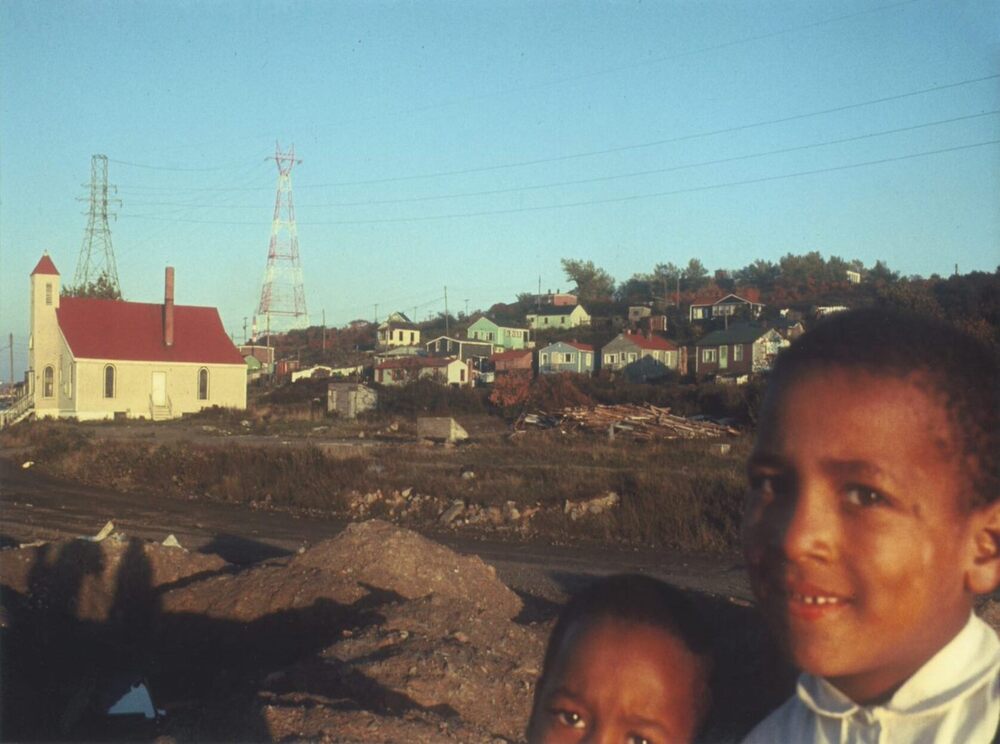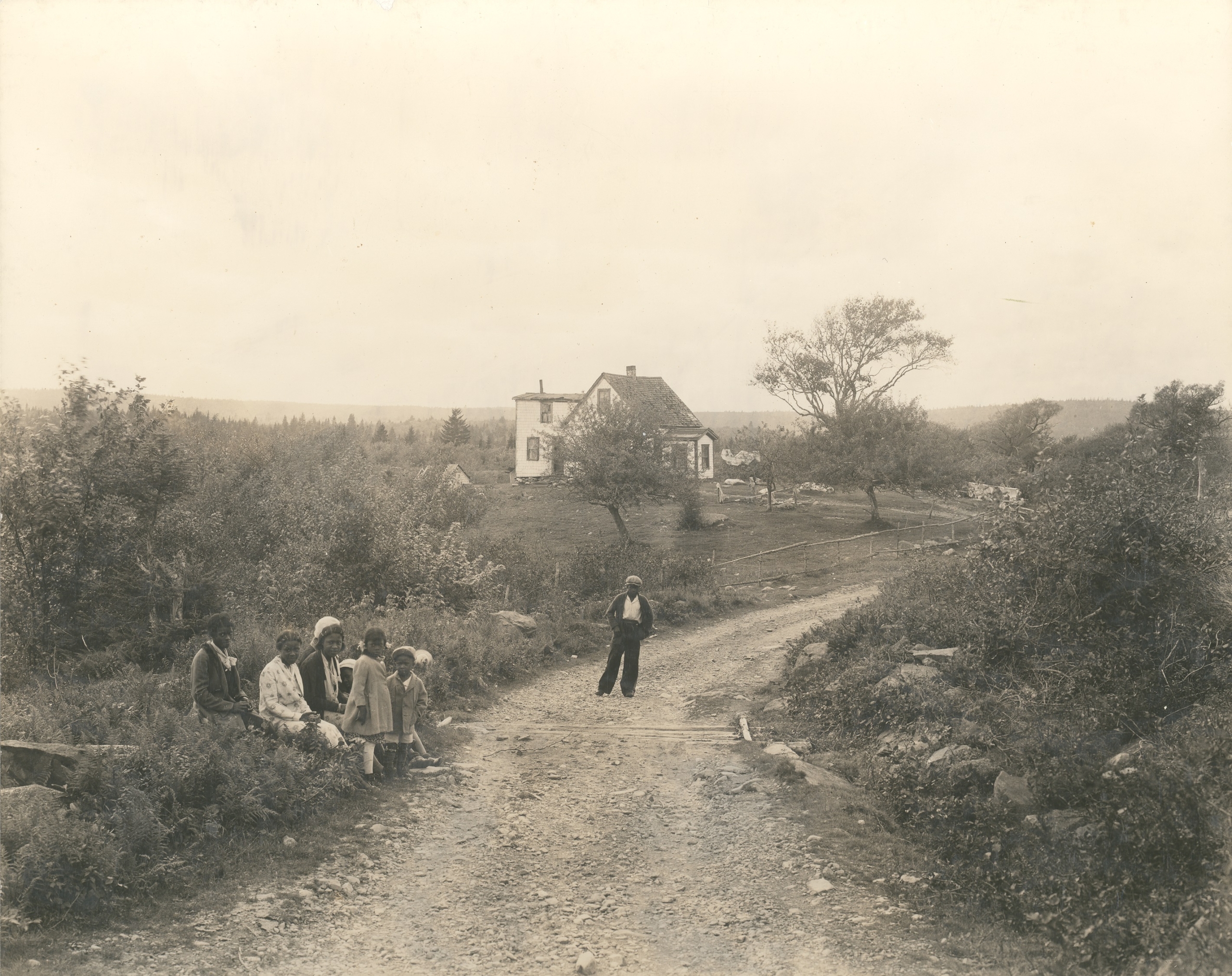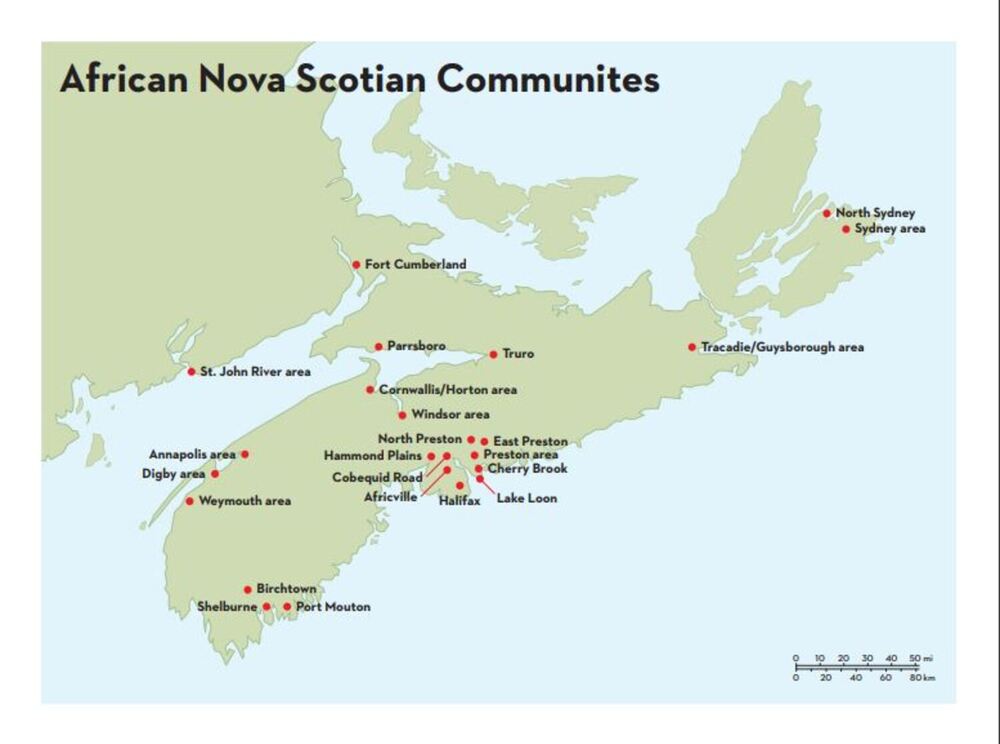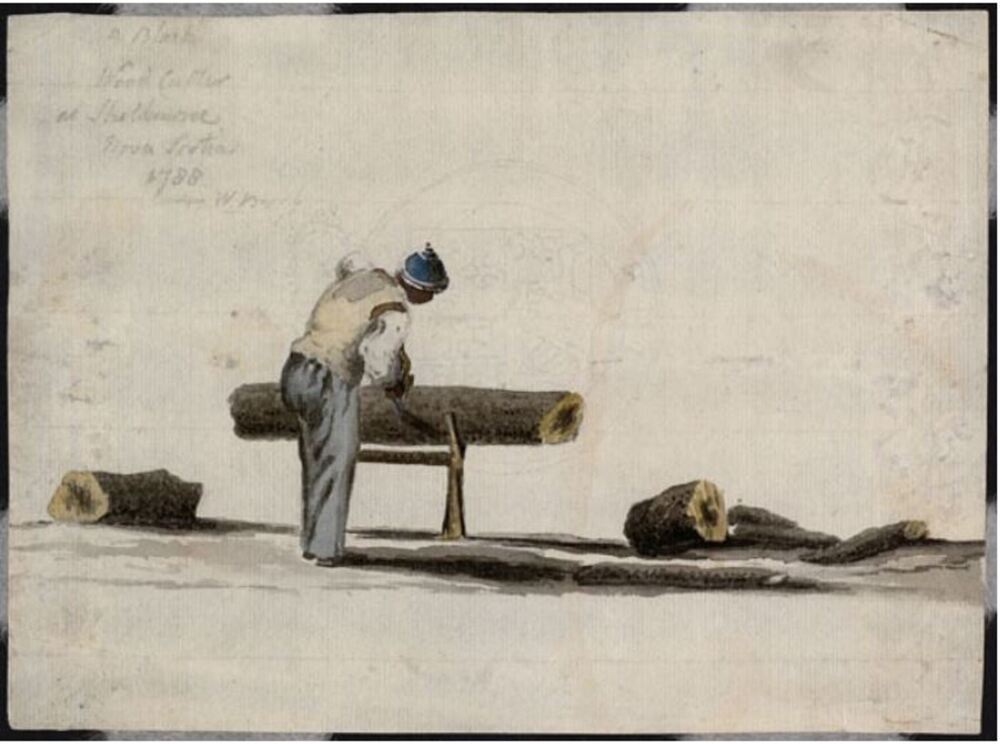
North Preston: New Road in the early 20th century.
Photograph


Image
Video
Audio
 Activities
Activities
LOOK
I see . . . (Describe what you see in the photograph.)
I think . . . (Describe what is happening in the photograph.)
I wonder . . . (What questions do you have about the photograph?)
THINK
Why is North Preston known for its resilience as a community?
DO
Find another historical picture of North Preston, or of another African Nova Scotian community. Share what you find.
Details
 Materials
Materials - Photograph
Historical Context
Choose one of the three levels below to match your needs.
- This 1930s photograph shows children from New Road, one of the oldest and largest Black community in Nova Scotia.
- The community changed its name to North Preston following a racist 1956 Maclean’s magazine article.
- The Land Titles Initiative (2017) and the Land Titles Clarification Act (2021) helped African Nova Scotians gain legal title to their land.
This 1930s photograph shows children from New Road, today known as North Preston, part of Greater Halifax, and one of the oldest and largest Black community in Nova Scotia.
Black Loyalists arrived in 1783–1784, following British promises of land. In 1796, they were joined by Maroons deported following an insurrection in Jamaica and brought to Halifax to help build fortifications on Citadel Hill.
The community changed its name to North Preston following a racist 1956 Maclean’s magazine article.
The Land Titles Initiative (2017) and the Land Titles Clarification Act (2021) have helped African Nova Scotians gain legal title to their land. Today, North Preston is a prosperous community with high home ownership, a stable population, and the highest concentration of African Canadians in Canada.
This group of children is pictured in a community called New Road in the 1930s. Today, the community is called North Preston.
Located just northeast of the Greater Halifax Area, North Preston is one of the oldest and largest Black communities in the province of Nova Scotia. It also has the highest concentration of African Canadians in Canada.
Some of the first settlers in North Preston were Black Loyalists, who arrived in Nova Scotia in 1783–1784 in response to a promise of land for their support of the British during the American War of Independence. Other early settlers include Black Jamaicans — often referred to as Maroons — who were deported from Jamaica following an insurrection in 1796. Many Maroons were brought to Nova Scotia to construct fortifications erected around the city of Halifax on Citadel Hill.
North Preston is known for its resilience, despite a history of racism towards its residents. In 1956, an article by Edna Staebler was published in Maclean’s magazine entitled “Would You Change the Lives of These People?” After visiting the community of New Road (as North Preston was then called), Staebler wrote about the community in racist and patronizing terms, including many of the stereotypes that have continued to plague the African Nova Scotian community.
By the 1970s, influenced in part by this national criticism, the community started to refer to itself as North Preston. Its name was officially changed in 1989.
Today, North Preston is a prosperous community with a high home-ownership rate and a stable population. The community’s stability has been supported by the recently passed Land Titles Initiative (2017), which is a government commitment to help residents in many African Nova Scotian communities receive legal title to their land. The Land Titles Clarification Act was passed in April 2021, further enhancing this process.
Before these initiatives, many residents in communities such as North Preston, East Preston, Cherry Brook, and Lake Loon did not have legal ownership of their property, and land was passed down through the generations without official title.
Having land titles means that residents now have specific rights, such as the ability to build on, develop, or sell the land, along with access to housing grants. Since 2017, almost 260 community members from North Preston have received clear titles to their land. This highlights the community’s pursuit of self-determination.
- This 1930s photograph shows children from New Road, one of the oldest and largest Black community in Nova Scotia.
- The community changed its name to North Preston following a racist 1956 Maclean’s magazine article.
- The Land Titles Initiative (2017) and the Land Titles Clarification Act (2021) helped African Nova Scotians gain legal title to their land.
This 1930s photograph shows children from New Road, today known as North Preston, part of Greater Halifax, and one of the oldest and largest Black community in Nova Scotia.
Black Loyalists arrived in 1783–1784, following British promises of land. In 1796, they were joined by Maroons deported following an insurrection in Jamaica and brought to Halifax to help build fortifications on Citadel Hill.
The community changed its name to North Preston following a racist 1956 Maclean’s magazine article.
The Land Titles Initiative (2017) and the Land Titles Clarification Act (2021) have helped African Nova Scotians gain legal title to their land. Today, North Preston is a prosperous community with high home ownership, a stable population, and the highest concentration of African Canadians in Canada.
This group of children is pictured in a community called New Road in the 1930s. Today, the community is called North Preston.
Located just northeast of the Greater Halifax Area, North Preston is one of the oldest and largest Black communities in the province of Nova Scotia. It also has the highest concentration of African Canadians in Canada.
Some of the first settlers in North Preston were Black Loyalists, who arrived in Nova Scotia in 1783–1784 in response to a promise of land for their support of the British during the American War of Independence. Other early settlers include Black Jamaicans — often referred to as Maroons — who were deported from Jamaica following an insurrection in 1796. Many Maroons were brought to Nova Scotia to construct fortifications erected around the city of Halifax on Citadel Hill.
North Preston is known for its resilience, despite a history of racism towards its residents. In 1956, an article by Edna Staebler was published in Maclean’s magazine entitled “Would You Change the Lives of These People?” After visiting the community of New Road (as North Preston was then called), Staebler wrote about the community in racist and patronizing terms, including many of the stereotypes that have continued to plague the African Nova Scotian community.
By the 1970s, influenced in part by this national criticism, the community started to refer to itself as North Preston. Its name was officially changed in 1989.
Today, North Preston is a prosperous community with a high home-ownership rate and a stable population. The community’s stability has been supported by the recently passed Land Titles Initiative (2017), which is a government commitment to help residents in many African Nova Scotian communities receive legal title to their land. The Land Titles Clarification Act was passed in April 2021, further enhancing this process.
Before these initiatives, many residents in communities such as North Preston, East Preston, Cherry Brook, and Lake Loon did not have legal ownership of their property, and land was passed down through the generations without official title.
Having land titles means that residents now have specific rights, such as the ability to build on, develop, or sell the land, along with access to housing grants. Since 2017, almost 260 community members from North Preston have received clear titles to their land. This highlights the community’s pursuit of self-determination.
Summary
- This 1930s photograph shows children from New Road, one of the oldest and largest Black community in Nova Scotia.
- The community changed its name to North Preston following a racist 1956 Maclean’s magazine article.
- The Land Titles Initiative (2017) and the Land Titles Clarification Act (2021) helped African Nova Scotians gain legal title to their land.
Essential
This 1930s photograph shows children from New Road, today known as North Preston, part of Greater Halifax, and one of the oldest and largest Black community in Nova Scotia.
Black Loyalists arrived in 1783–1784, following British promises of land. In 1796, they were joined by Maroons deported following an insurrection in Jamaica and brought to Halifax to help build fortifications on Citadel Hill.
The community changed its name to North Preston following a racist 1956 Maclean’s magazine article.
The Land Titles Initiative (2017) and the Land Titles Clarification Act (2021) have helped African Nova Scotians gain legal title to their land. Today, North Preston is a prosperous community with high home ownership, a stable population, and the highest concentration of African Canadians in Canada.
In-Depth
This group of children is pictured in a community called New Road in the 1930s. Today, the community is called North Preston.
Located just northeast of the Greater Halifax Area, North Preston is one of the oldest and largest Black communities in the province of Nova Scotia. It also has the highest concentration of African Canadians in Canada.
Some of the first settlers in North Preston were Black Loyalists, who arrived in Nova Scotia in 1783–1784 in response to a promise of land for their support of the British during the American War of Independence. Other early settlers include Black Jamaicans — often referred to as Maroons — who were deported from Jamaica following an insurrection in 1796. Many Maroons were brought to Nova Scotia to construct fortifications erected around the city of Halifax on Citadel Hill.
North Preston is known for its resilience, despite a history of racism towards its residents. In 1956, an article by Edna Staebler was published in Maclean’s magazine entitled “Would You Change the Lives of These People?” After visiting the community of New Road (as North Preston was then called), Staebler wrote about the community in racist and patronizing terms, including many of the stereotypes that have continued to plague the African Nova Scotian community.
By the 1970s, influenced in part by this national criticism, the community started to refer to itself as North Preston. Its name was officially changed in 1989.
Today, North Preston is a prosperous community with a high home-ownership rate and a stable population. The community’s stability has been supported by the recently passed Land Titles Initiative (2017), which is a government commitment to help residents in many African Nova Scotian communities receive legal title to their land. The Land Titles Clarification Act was passed in April 2021, further enhancing this process.
Before these initiatives, many residents in communities such as North Preston, East Preston, Cherry Brook, and Lake Loon did not have legal ownership of their property, and land was passed down through the generations without official title.
Having land titles means that residents now have specific rights, such as the ability to build on, develop, or sell the land, along with access to housing grants. Since 2017, almost 260 community members from North Preston have received clear titles to their land. This highlights the community’s pursuit of self-determination.


